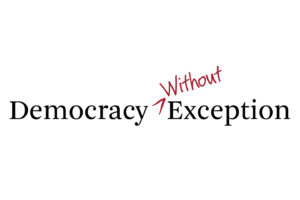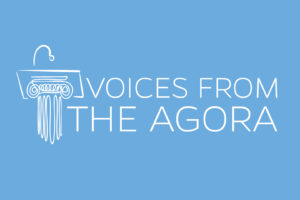
For too long, the idea that democracy’s decline could not happen in the United States has stood apart from the reality unfolding at home and abroad. Democracy Without Exception rejects that notion. It takes as its starting point that democracy in the U.S. rises or falls with democracy everywhere else.
The editors call the lens “intermestic.” Instead of separating domestic and international, they treat them as parts of a single map. A labor strike in São Paulo may have lessons for Scranton. A city policy in Phoenix could inform officials in Manila. Liz Ramey, one of the newsletter’s three editors, said, “When you show the general trends, you move away from the way these conversations are often coded as partisan.” She added that this comparative lens “helps people see that democracy questions are not just about left or right in the U.S., but about patterns that cut across contexts.”
Ramey works alongside Jon Temin, a 2025–26 Visiting Fellow at the SNF Agora Institute, and Scott Warren, an SNF Agora Fellow and JHU faculty member. Together, the three bring policy expertise, civic practice, and organizational skill. Their collaboration reflects SNF Agora’s mission to advance democracy through discovery, design, and dialogue, connecting ideas with practice and testing them in public.
They write the newsletter for “the people who can make things happen… activists, policy makers, grant makers, program implementers,” said Temin. He described the project as highlighting “people who have things to say drawing from hands-on experience.”
For Scott Warren, the target audience is clear. “The audience is the pro-democracy community,” he said. He also emphasized the importance of who contributes: “city officials, frontline folks, people in other countries who don’t always get a platform.”
Recent posts show the range of topics, from labor and immigration to coalitions and unions. The thread running through them is utility: each essay attempts to turn lived experience into steps others can adapt in their own context.
Essays are published most Wednesdays and are free to read and share. The editors want these posts to land in planning calls, funder briefings, and community meetings, places where a short piece can help shape the next steps. “We hope readers will not only follow the conversation but also contribute their own experiences and perspectives,” said Ramey. The editors encourage submissions from practitioners in the field and invite new voices to join.
That is the promise of Democracy Without Exception: a weekly dispatch for people building democracy in real places, with real constraints. Patterns that once stood apart are now part of the same story, and the newsletter carries those lessons from one context to another. Readers can subscribe on Substack to receive each new piece directly in their inbox.

